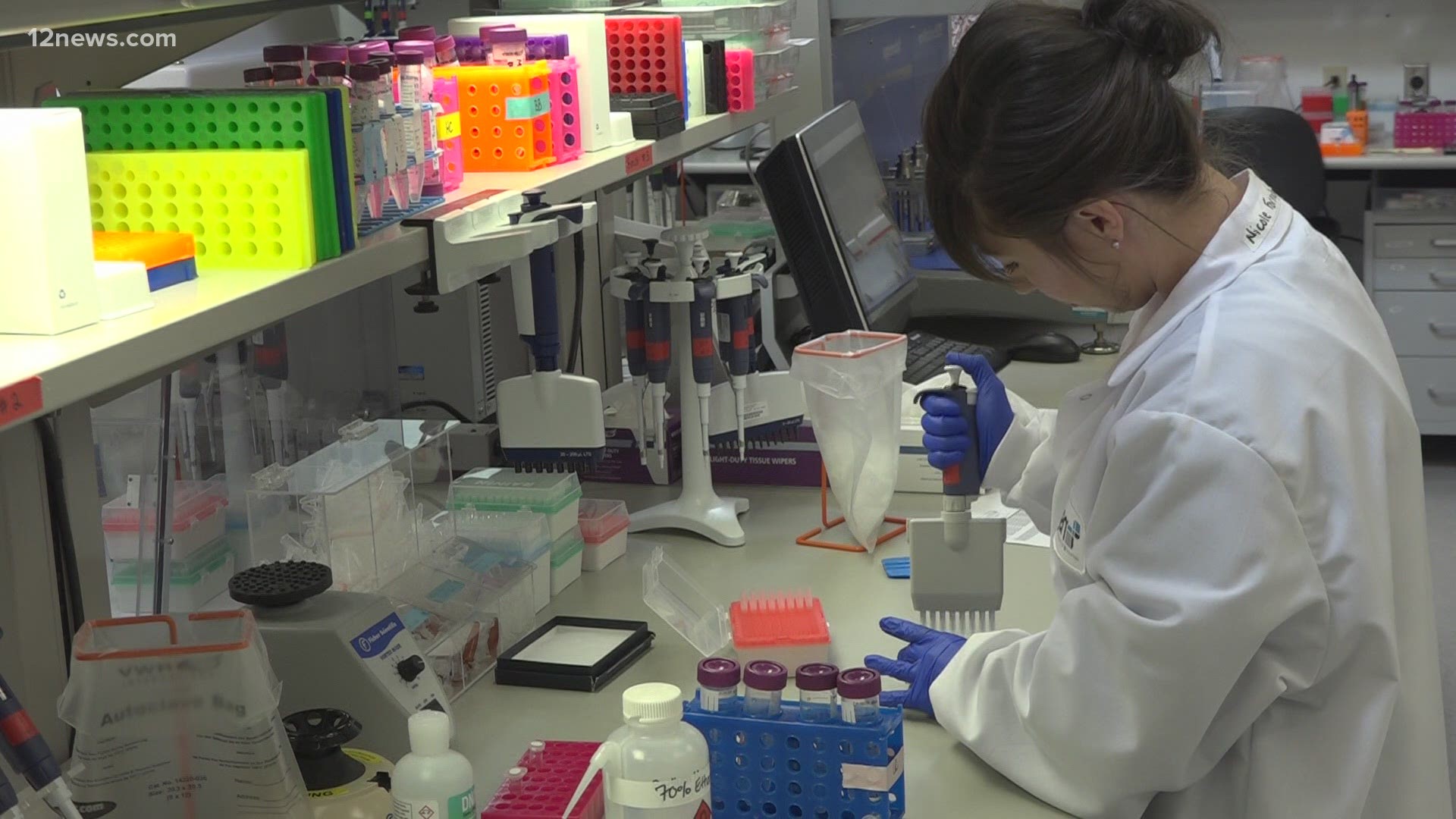PHOENIX — As new variants of COVID-19 spread across the globe, including the United States, researchers in Arizona are monitoring them as they evolve.
How variants are identified
The Translational Genomics Research Institute (TGen) has been sequencing the genomes of COVID-19 samples in Arizona for months as the virus has spread in the state.
Essentially they look at the RNA of the virus, using samples from patients who’ve tested positive for COVID-19.
“It gives us intel on the virus that we can’t get otherwise,” Dr. David Engelthaler, director of TGen North in Flagstaff, said.
Coronaviruses commonly mutate
Human coronaviruses are known to change and mutate the longer they exist.
“Every time it infects a new person, it has a chance of picking up a new mutation,” Engelthaler said.
The mutations currently making headlines are not the first mutation to spread rapidly. A strain from Europe identified by TGen was what spread significantly in Arizona in the spring.
“These variants should not be alarming that it's evolving,” Engelthaler said. “That's what we expected.”
Usually, Engelthaler said they change to be less deadly but spread more easily.
“They evolve to become very easily spread but less virulent hopefully that's what's happening, but until we actually see that, we got to take this very seriously,” Engelthaler said.
What variants researchers are watching
Engelthaler said he’s keeping an eye on the U.K. variant, Brazilian variant, South African variant and Southern California variant.
All of them have been found in the U.S. Most commonly, the U.K. variant has spread to several states, while the Brazilian and South African have not been as commonly found.
The Southern California strain has also been found in Arizona, according to Engelthaler.
On Friday evening, the Arizona Department of Health Services confirmed the U.K. variant was found in the state.
“Little bit of survival the fittest battle between these different strains and which ones are going to become predominant in different regions, and it's going to be the ones that spread easiest from person to person,” Engelthaler said.
How do vaccines perform against variants?
Vaccines currently in distribution do work against the different variants of COVID-19, Engelthaler said.
However, there is evidence suggesting the South African strain could dampen immunity effects from vaccines.
Engelthaler said that’s what’s most concerning about the variants currently circulating.
“We are seeing mutations that are allowing the virus to escape some antibodies, not the overall whole immune system,” Engelthaler said. “But little by little, more mutations that are like that will essentially mean that our vaccines won't be as effective and we're going to have to get updated vaccines.”
Engelthaler said the technology for COVID-19 vaccines can be adapted, in as quickly as a few weeks, to protect against different variants if needed.
“We got to not only continually look for these particular mutations, but we also want to make sure we're testing them against the the vaccine strains that are out there to make sure that we still have the really high effectiveness, that we have with the current vaccines,” Engelthaler said.
What could the variants mean for COVID-19 spread
First things first, Engelthaler said getting the vaccines we do have to protect against COVID-19 into people’s arms can help slow the spread of the variants.
“Essentially, that virus is looking for the next susceptible person, if they're vaccinated, that virus is going nowhere,” Engelthaler said.
But he says how much we’ve seen COVID-19 spread already plays a factor too.
“There's a lot of immunity being developed throughout Arizona in other places just because we've already suffered through a good chunk of this pandemic,” Engelthatler said. “That's not going to protect us. But that will slow down the, the strains that otherwise might just go like wildfire.”
However, he warns the variants can lead to increased cases, reminding it’s still necessary to take mitigation measures.
“Certainly concerning that some of these new variants seem to spread even faster than what we were seeing before, and that spread really fast, which means that there will be more cases,” Engelthaler said.
“And it means that you might actually get to more people that are at higher risk, and then start to get back into the hospital again.”
For full coverage on COVID-19 and the vaccines, subscribe to the 12 News YouTube channel.

